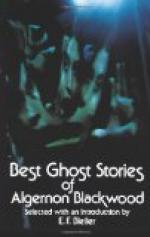To the right of the window was a door covered with a plush curtain. Mrs. Wilton sat down near the table and watched this door. She thought it must be through it that the soothsayer would come forth. She laid her hands listlessly one on top of the other on the table. This must be the tenth seer she had consulted since Hugh had been killed. She thought them over. No, this must be the eleventh. She had forgotten that frightening man in Paris who said he had been a priest. Yet of them all it was only he who had told her anything definite. But even he could do no more than tell the past. He told of her marriage; he even had the duration of it right—twenty-one months. He told too of their time in India—at least, he knew that her husband had been a soldier, and said he had been on service in the “colonies.” On the whole, though, he had been as unsatisfactory as the others. None of them had given her the consolation she sought. She did not want to be told of the past. If Hugh was gone forever, then with him had gone all her love of living, her courage, all her better self. She wanted to be lifted out of the despair, the dazed aimless drifting from day to day, longing at night for the morning, and in the morning for the fall of night, which had been her life since his death. If somebody could assure her that it was not all over, that he was somewhere, not too far away, unchanged from what he had been here, with his crisp hair and rather slow smile and lean brown face, that he saw her sometimes, that he had not forgotten her. . . .
“Oh, Hugh, darling!”
When she looked up again the woman was sitting there before her. Mrs. Wilton had not heard her come in. With her experience, wide enough now, of seers and fortune-tellers of all kinds, she saw at once that this woman was different from the others. She was used to the quick appraising look, the attempts, sometimes clumsy, but often cleverly disguised, to collect some fragments of information whereupon to erect a plausible vision. But this woman looked as if she took it out of herself.
Not that her appearance suggested intercourse with the spiritual world more than the others had done; it suggested that, in fact, considerably less. Some of the others were frail, yearning, evaporated creatures, and the ex-priest in Paris had something terrible and condemned in his look. He might well sup with the devil, that man, and probably did in some way or other.
But this was a little fat, weary-faced woman about fifty, who only did not look like a cook because she looked more like a sempstress. Her black dress was all covered with white threads. Mrs. Wilton looked at her with some embarrassment. It seemed more reasonable to be asking a woman like this about altering a gown than about intercourse with the dead. That seemed even absurd in such a very commonplace presence. The woman seemed timid and oppressed: she breathed heavily and kept rubbing her dingy hands, which looked moist, one over the other; she was always wetting her lips, and coughed with a little dry cough. But in her these signs of nervous exhaustion suggested overwork in a close atmosphere, bending too close over the sewing-machine. Her uninteresting hair, like a rat’s pelt, was eked out with a false addition of another color. Some threads had got into her hair too.




